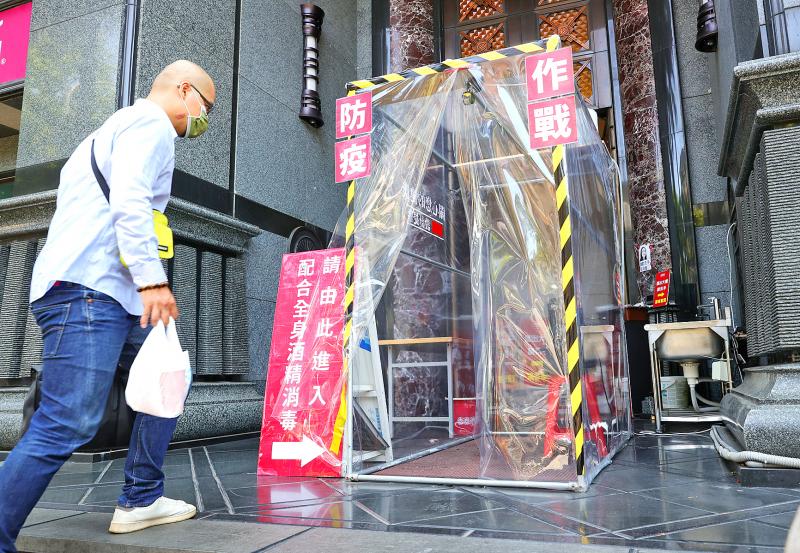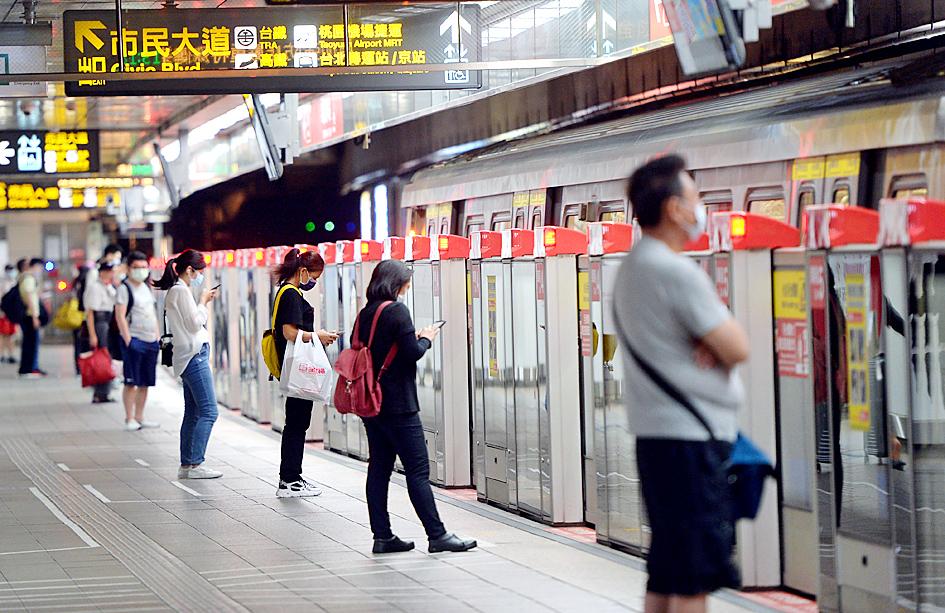Cold and allergy symptoms, while similar to those of COVID-19, have some differences that could help determine the cause, a physician said on Sunday as he shared tips on how to differentiate between them.
As a local COVID-19 outbreak spreads, so does anxiety over health as people wonder whether nasal congestion and difficulty breathing are caused by allergies or COVID-19, said pediatrician Ken Tsui (徐嘉賢), who runs a clinic under his name in Kaohsiung.
To help ease concerns, Tsui shared on Facebook on Saturday ways to differentiate between a cold, allergies and COVID-19.

Photo: CNA
However, he said that each person’s symptoms are different and clinical advice should be sought if there are any doubts.
Allergic symptoms generally flare up over a fixed period and do not change, Tsui said.
They also do not involve a fever or loss of taste, which are common symptoms of COVID-19, but chronic sinus allergies and sinusitis could cause a loss of smell, he added.

Photo: Lin Cheng-kung, Taipei Times
While associated with shortness of breath, asthma is often also accompanied by a cough and wheezing, Tsui said, adding that the most important difference between allergies and COVID-19 is the lack of a fever.
On the other hand, symptoms of the common cold tend to change over time, Tsui said.
For example, they start with sneezing, followed by a runny nose the next day and a sore throat the day after that, he said, adding that a fever is also possible.
These are very similar to COVID-19 symptoms, he said.
However, due to its variability, with some cases not displaying any symptoms at all, COVID-19 can be difficult to diagnose, Tsui said.
Abnormal senses of taste and smell are not unique to COVID-19, but their incidence rate is, with 68 to 85 percent of people with COVID-19 reporting a loss of smell and 71 to 88.8 percent a loss of taste, he said.
These symptoms appear early, before the novel coronavirus has entered the lungs, he added.
The only way to be sure of a COVID-19 infection is through testing, Tsui said, but strongly urged against undergoing a test unless recommended by a doctor or listed as a contact of a confirmed case.
Crowding testing centers and hospitals only increases the risk of infection, while putting more work on overtaxed medical personnel, he added.
Tsui urged people to avoid crowded areas until vaccines are made available, adding that the pandemic would end only when a certain percentage of people have been vaccinated.
He advised people with allergies to try to control their symptoms to avoid causing unnecessary worry at this time.
In related news, the Taipei-based I Care Health Institute shared on Facebook three tips on how to properly sanitize a surface with alcohol.
People should let the alcohol sit on the surface for at least 15 seconds to take effect, it said.
Wiping the surface is more effective than spraying alone, it added.
People should use 75 percent alcohol solution, as anything more or less concentrated would be less effective, it said.
The clinic also reminded people that alcohol is a flammable substance and should be kept away from fire at all times.
People can use hand lotion if frequent exposure to alcohol causes dryness, it added.

An essay competition jointly organized by a local writing society and a publisher affiliated with the Chinese Communist Party (CCP) might have contravened the Act Governing Relations Between the People of the Taiwan Area and the Mainland Area (臺灣地區與大陸地區人民關係條例), the Mainland Affairs Council (MAC) said on Thursday. “In this case, the partner organization is clearly an agency under the CCP’s Fujian Provincial Committee,” MAC Deputy Minister and spokesperson Liang Wen-chieh (梁文傑) said at a news briefing in Taipei. “It also involves bringing Taiwanese students to China with all-expenses-paid arrangements to attend award ceremonies and camps,” Liang said. Those two “characteristics” are typically sufficient

A magnitude 5.9 earthquake that struck about 33km off the coast of Hualien City was the "main shock" in a series of quakes in the area, with aftershocks expected over the next three days, the Central Weather Administration (CWA) said yesterday. Prior to the magnitude 5.9 quake shaking most of Taiwan at 6:53pm yesterday, six other earthquakes stronger than a magnitude of 4, starting with a magnitude 5.5 quake at 6:09pm, occurred in the area. CWA Seismological Center Director Wu Chien-fu (吳健富) confirmed that the quakes were all part of the same series and that the magnitude 5.5 temblor was

The brilliant blue waters, thick foliage and bucolic atmosphere on this seemingly idyllic archipelago deep in the Pacific Ocean belie the key role it now plays in a titanic geopolitical struggle. Palau is again on the front line as China, and the US and its allies prepare their forces in an intensifying contest for control over the Asia-Pacific region. The democratic nation of just 17,000 people hosts US-controlled airstrips and soon-to-be-completed radar installations that the US military describes as “critical” to monitoring vast swathes of water and airspace. It is also a key piece of the second island chain, a string of

The Central Weather Administration has issued a heat alert for southeastern Taiwan, warning of temperatures as high as 36°C today, while alerting some coastal areas of strong winds later in the day. Kaohsiung’s Neimen District (內門) and Pingtung County’s Neipu Township (內埔) are under an orange heat alert, which warns of temperatures as high as 36°C for three consecutive days, the CWA said, citing southwest winds. The heat would also extend to Tainan’s Nansi (楠西) and Yujing (玉井) districts, as well as Pingtung’s Gaoshu (高樹), Yanpu (鹽埔) and Majia (瑪家) townships, it said, forecasting highs of up to 36°C in those areas